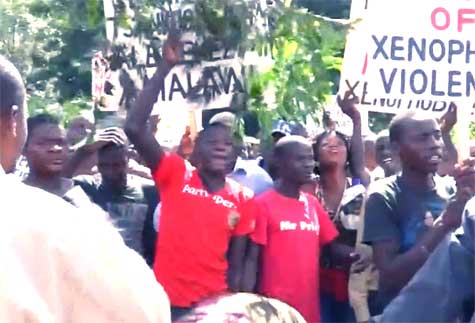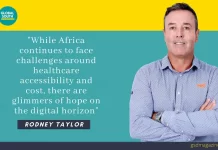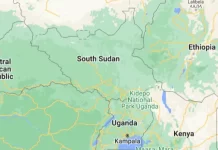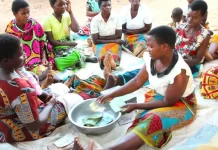By WINSTON MWALE
Incensed with the on-going brutal and barbaric xenophobic attacks in South Africa, Civil Society Organizations in Malawi have presented a petition to the South African High Commissioner to the country, Cassandra Mbuyane Mokone. Reports have it that 2 Malawians have been killed in the xenophobic attacks so far.
“We, the people of Malawi, stand in solidarity with all Africans to condemn in the strongest terms the current resurgence of xenophobia in the Republic of South Africa. “In 2008, we came to this embassy to demand a stop to acts of wanton violence on migrant workers from the SADC region including Malawi,” read part of the petition.
The marchers told the South African High Commissioner that her predecessor had promised Malawians that “never again” would fellow Africans be subjected to such cruel and degrading acts of violence. “Sadly, today we stand here to see history repeating itself. Xenophobia is the new apartheid, and it threatens to undo the gains that South Africa has made after the end of apartheid. It threatens the human rights of all (especially migrants) and the flourishing of true free and tolerant New South Africa,” said the marchers in the petition.

The marchers called upon the Government of South Africa to urgently remove the structural inequalities that are allegedly rooted in apartheid and white privilege. According to the CSOs, these are the main causes of worsening economic inequality and marginalization. The CSOs further said these inequities were not instituted by migrants, and will not automatically disappear if the migrant population decreases; adding that the most sustainable way to address the economic frustrations felt by many South Africans is to adopt policies that reduce the inequalities, and create programs that empower ordinary South Africans.
“We urge the Government of South Africa to categorically condemn any individual or institution that encourages the widespread use of xenophobic, aggressive and militarized rhetoric as a trend of blaming foreigners for social ills.” The Malawian CSOs appealed to civil society organizations in South Africa to promote the rights of migrants, by contributing to civic and human rights education in order to enhance values of equality.
“We call upon the Government of South Africa, in line with provisions in their Constitution and International legal obligations, to protect the rights of all people living in South Africa and to address the root causes of xenophobia,” said the CSOs. Furthermore, the CSOs demanded that the South African Police Service and the South African Human Rights Commission should thoroughly investigate the xenophobic attacks and hold all those responsible accountable.
“We note with disappointment that perpetrators of previous xenophobic violence were not held accountable for the killing of more than 60 people across South Africa in 2008,” read the petition. “We wish to remind the South African Government of how other African countries including Zimbabwe, sacrificed their socio-economic and political resources in solidarity with South African liberation movements to bring an end to evil apartheid.
In light of these extreme sacrifices by African people, we expect the South African authorities and its citizens to reciprocate the solidarity through Ubuntu and shunning of Xenophobia.” The Malawian said they were disgusted by the ‘reckless xenophobic utterances’ by senior political figures such as Zulu King Goodwill Zwelithini, Small Business Development Minister Lindiwe Zulu and President Zuma’s son Edward that continue to incite violence against foreign nationals.
But speaking during a rally recently, Zwelithini denied instigating the xenophobic attacks. He said accusations against him of inciting violence were incorrect because the country has only been shown a portion of his speech. “If it were true that I said foreigners must go, this country would be up in flames,” he added.
Meanwhile, South Africa’s army has been deployed to volatile areas to prevent attacks on foreigners, Defence Minister Nosiviwe Mapisa-Nqakula has said. The army was intervening because an “emergency” had developed, she said. Foreign governments have strongly criticized South Africa for failing to protect their nationals. At least seven people have been killed and 5,000 left homeless since the attacks started about three weeks ago against other Africans and Asians.










